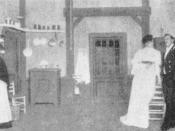"It is man versus woman all day long endlessly" (Strindberg). Do I agree with this statement after having read the play? The representation we get of young Miss Julie through the gossips from the outset shows the plays investment I her degeneracy and ruin. Strindberg portrays Miss Julie as being hysterical which was considered to be a female sickness in his days.
The setting of Miss Julie takes place on a Midsummer's Eve, which is a festival of pagan origins that is celebrated in the European region. This can be seen as rather significant since a number of critics have associated the paganism of the festival to the lust of the characters. It is also fairly predictable that Miss Julie and Jean's sexual encounter, which can be seen as a negative meeting of class lines, would occur during the period of the pagan festival. This is so because it can be seen as an occasion for deception, a time for rebellion against the moral confines of society and also a time for the crossing of social boundaries.
The play begins with Christine the cook and Jean the counts servant discussing Miss Julie their superior in the kitchen. We are told through their conversation that Miss Julie is "wild" tonight, which means that she is behaving in a rather vulgar manner, dancing and frolicking with the servants and making unabashed advancements at Jean.
They then go on to speak about her broken engagement which has left her rambunctious, or more simply put unruly. This scene is very important because we are told that the reason for her fiancé leaving her is as a result of her attempt to dominate him. This scene also introduces us to Miss Julie's sadistic ways. Her attitude towards men can be seen as...


